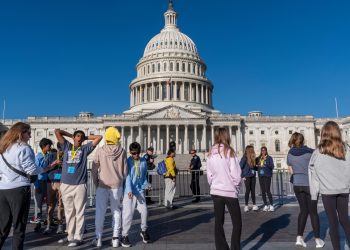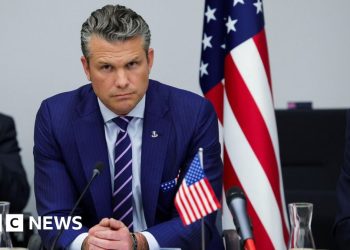Pfizer CEO Albert Bourla, Wells Fargo & Company CEO Charlie Scharf and Northrop Grumman Chairman and CEO Kathy Warden speak at the Invest in America Forum on October 15, 2025.
Aaron Clamage | CNBC
Wells Fargo CEO Charlie Scharf and Pfizer CEO Albert Bourla sounded the alarm Wednesday that the United States could lose its competitive edge to China, but said artificial intelligence could help America maintain its lead.
Speaking at CNBC’s first Invest in America forum in Washington, D.C., the two leaders said that while the United States remains ahead in many sectors, its inconsistent policy and underinvestment is losing ground to China. They say AI poses both risks and benefits to the U.S. economy.
Scharf said AI would likely reduce the size of the workforce, but increase productivity.
“We will probably have fewer people, absolutely,” Scharf said. “When we look at the tools we’ve implemented just for people who code, you see a 20%, 30%, 40% improvement in coders. We haven’t reduced our workforce by 20%, 30%, or 40%. We’re actually doing more than we could have done otherwise.”
Wells Fargo’s big banks, like JPMorgan and Goldman Sachs, are already hiring fewer staff due to advances in AI.
Scharf also said the financial industry is ready to undergo major regulatory changes despite the current political impasse in Washington.
“We ultimately expect significant changes in capital and liquidity requirements,” he said. “We expect to see changes that will allow industry players, not only large and mid-sized banks, but also small banks, to do more in these (local) communities.”
Bourla, meanwhile, expressed concern about China’s growing power in biotechnology and pharmaceuticals, pointing to increased spending on research and development, regulatory reforms and a national strategy focused on life sciences.
“They (China) filed more patents this year than the United States,” Bourla said. “This has never happened in history. Five years ago, the split was 90 to 10%. (…) The gap is narrowing, but they will probably become (better than us) if we don’t get our act together.”
Bourla urged the United States to stop trying to slow China’s progress and improve its own productivity and innovation.
“We spend more time trying to think about how to slow China down rather than thinking about how we can become better than China,” Bourla said. “We need regulatory changes here. We need stability. Tariffs and prices weren’t helping.”
Pfizer recently reached a drug pricing agreement with the Trump administration as part of a broader effort to resolve long-standing uncertainties over pricing, Medicaid reimbursements and distribution. As part of the agreement, Pfizer was granted a three-year exemption from specific tariffs on pharmaceutical products, subject to additional investment in the US manufacturing sector.
““Tariffs and the uncertainty of a drastic price correction in the United States — with this agreement we eliminate both of those uncertainties,” Bourla said Wednesday.
He also called artificial intelligence the next frontier for medicine, predicting that it would revolutionize drug discovery by dramatically speeding up the timeline for finding treatments for diseases like Alzheimer’s and cancer.
“We’ve been trying for years to find cures… AI will do it,” Bourla said.









